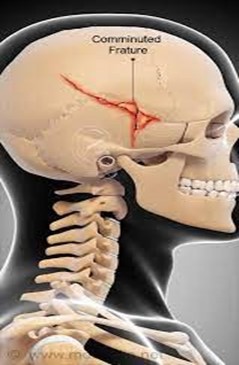A nurse is caring for a client admitted with a skull fracture.
Which of the following assessment findings should be of greatest concern to the nurse?
Glasgow Coma Scale score changes from 14 to 9.
WBC count changes from 9,000 to 16,000/mm.
Pulse pressure changes from 30 to 20 mm Hg.
Bilateral pupil diameter changes from 4 to 2 mm.
The Correct Answer is A

A decrease in the Glasgow Coma Scale (GCS) score indicates a decline in the client’s level of consciousness and neurological function.
This can be a sign of increased intracranial pressure or other complications related to the skull fracture.
Choice B is incorrect because an increase in WBC count may indicate an infection, but it is not as concerning as a decrease in GCS score.
Choice C is incorrect because a change in pulse pressure may indicate changes in cardiovascular function, but it is not as concerning as a decrease in GCS score.
Choice D is incorrect because a change in pupil diameter may indicate changes in neurological function, but it is not as concerning as a decrease in GCS score.
Nursing Test Bank
Naxlex Comprehensive Predictor Exams
Related Questions
Correct Answer is A
Explanation
This statement indicates an understanding of the teaching because cool, clammy skin is a common symptom of hypoglycemia.
Choice B is incorrect because acetone breath is a symptom of hyperglycemia (high blood sugar), not hypoglycemia (low blood sugar).
Choice C is incorrect because Kussmaul respirations (deep and labored breathing) are a symptom of hyperglycemia, not hypoglycemia.
Choice D is incorrect because increased urine output is a symptom of hyperglycemia, not hypoglycemia.
Correct Answer is A
Explanation
The nurse’s priority assessment in the PACU (Post-Anesthesia Care Unit) should be the client’s respiratory status.

This is because the client is recovering from anesthesia and may have an altered respiratory function.
Choice B, assessing the surgical site, is not an answer because it is not the priority assessment for a client in the PACU.
Choice C, assessing the level of consciousness, is not an answer because it is not the priority assessment for a client in the PACU.
Choice D, assessing the pain level, is not an answer because it is not the priority assessment for a client in the PACU.
Whether you are a student looking to ace your exams or a practicing nurse seeking to enhance your expertise , our nursing education contents will empower you with the confidence and competence to make a difference in the lives of patients and become a respected leader in the healthcare field.
Visit Naxlex, invest in your future and unlock endless possibilities with our unparalleled nursing education contents today
Report Wrong Answer on the Current Question
Do you disagree with the answer? If yes, what is your expected answer? Explain.
Kindly be descriptive with the issue you are facing.
